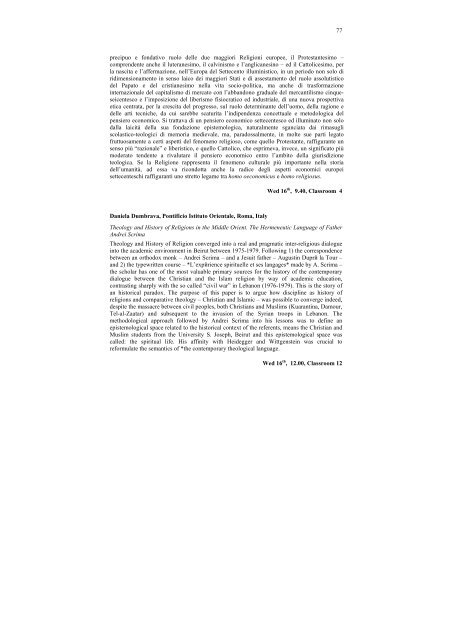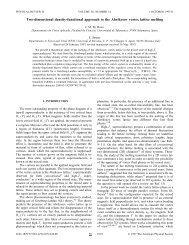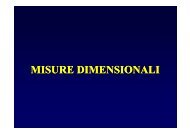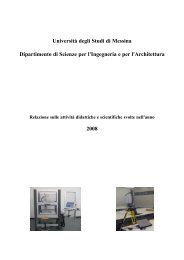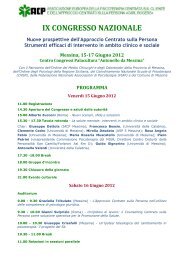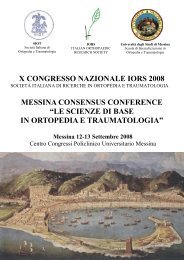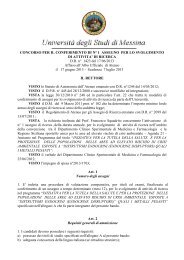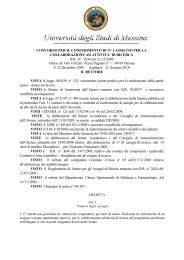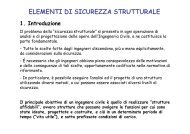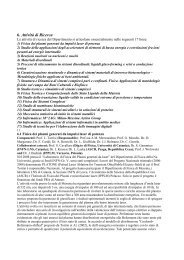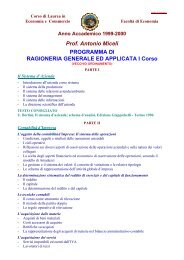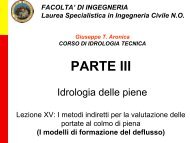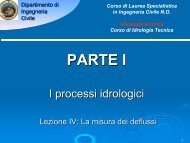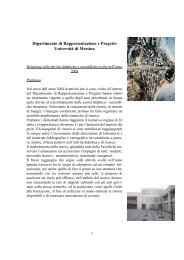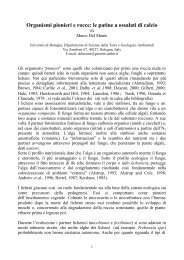PROGRAMME AND ABSTRACTS - Università degli Studi di Messina
PROGRAMME AND ABSTRACTS - Università degli Studi di Messina
PROGRAMME AND ABSTRACTS - Università degli Studi di Messina
Create successful ePaper yourself
Turn your PDF publications into a flip-book with our unique Google optimized e-Paper software.
precipuo e fondativo ruolo delle due maggiori Religioni europee, il Protestantesimo –<br />
comprendente anche il luteranesimo, il calvinismo e l’anglicanesino – ed il Cattolicesimo, per<br />
la nascita e l’affermazione, nell’Europa del Settecento illuministico, in un periodo non solo <strong>di</strong><br />
ri<strong>di</strong>mensionamento in senso laico dei maggiori Stati e <strong>di</strong> assestamento del ruolo assolutistico<br />
del Papato e del cristianesimo nella vita socio-politica, ma anche <strong>di</strong> trasformazione<br />
internazionale del capitalismo <strong>di</strong> mercato con l’abbandono graduale del mercantilismo cinqueseicentesco<br />
e l’imposizione del liberismo fisiocratico ed industriale, <strong>di</strong> una nuova prospettiva<br />
etica centrata, per la crescita del progresso, sul ruolo determinante dell’uomo, della ragione e<br />
delle arti tecniche, da cui sarebbe scaturita l’in<strong>di</strong>pendenza concettuale e metodologica del<br />
pensiero economico. Si trattava <strong>di</strong> un pensiero economico settecentesco ed illuminato non solo<br />
dalla laicità della sua fondazione epistemologica, naturalmente sganciata dai rimasugli<br />
scolastico-teologici <strong>di</strong> memoria me<strong>di</strong>evale, ma, paradossalmente, in molte sue parti legato<br />
fruttuosamente a certi aspetti del fenomeno religioso, come quello Protestante, raffigurante un<br />
senso più “razionale” e liberistico, e quello Cattolico, che esprimeva, invece, un significato più<br />
moderato tendente a rivalutare il pensiero economico entro l’ambito della giuris<strong>di</strong>zione<br />
teologica. Se la Religione rappresenta il fenomeno culturale più importante nella storia<br />
dell’umanità, ad essa va ricondotta anche la ra<strong>di</strong>ce <strong>degli</strong> aspetti economici europei<br />
settecenteschi raffiguranti uno stretto legame tra homo oeconomicus e homo religiosus.<br />
Daniela Dumbrava, Pontificio Istituto Orientale, Roma, Italy<br />
77<br />
Wed 16 th , 9.40, Classroom 4<br />
Theology and History of Religions in the Middle Orient. The Hermeneutic Language of Father<br />
Andrei Scrima<br />
Theology and History of Religion converged into a real and pragmatic inter-religious <strong>di</strong>alogue<br />
into the academic environment in Beirut between 1975-1979. Following 1) the correspondence<br />
between an orthodox monk – Andrei Scrima – and a Jesuit father – Augustin Duprй la Tour –<br />
and 2) the typewritten course – *L’expйrience spirituelle et ses langages* made by A. Scrima –<br />
the scholar has one of the most valuable primary sources for the history of the contemporary<br />
<strong>di</strong>alogue between the Christian and the Islam religion by way of academic education,<br />
contrasting sharply with the so called “civil war” in Lebanon (1976-1979). This is the story of<br />
an historical paradox. The purpose of this paper is to argue how <strong>di</strong>scipline as history of<br />
religions and comparative theology – Christian and Islamic – was possible to converge indeed,<br />
despite the massacre between civil peoples, both Christians and Muslims (Kuarantina, Damour,<br />
Tel-al-Zaatar) and subsequent to the invasion of the Syrian troops in Lebanon. The<br />
methodological approach followed by Andrei Scrima into his lessons was to define an<br />
epistemological space related to the historical context of the referents, means the Christian and<br />
Muslim students from the University S. Joseph, Beirut and this epistemological space was<br />
called: the spiritual life. His affinity with Heidegger and Wittgenstein was crucial to<br />
reformulate the semantics of *the contemporary theological language.<br />
Wed 16 th , 12.00, Classroom 12


